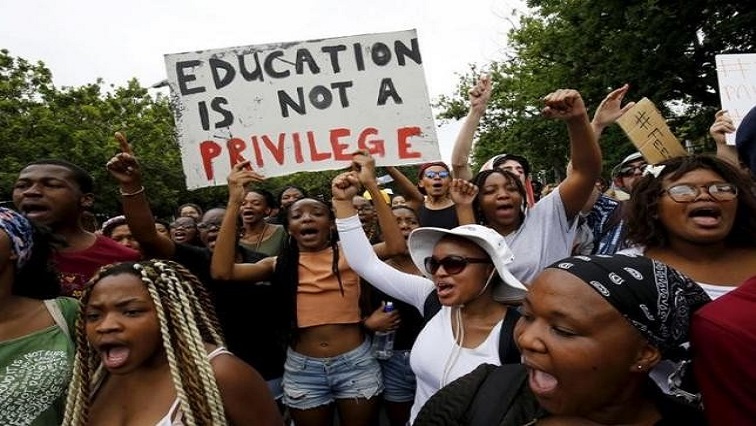For the first time, Youth Day will not be celebrated with the youth gathered in large numbers due to the COVID-19 pandemic.
The day will be celebrated virtually under the theme “Youth Power: Growing South Africa together in a period of COVID-19”.
Young people are encouraged and invited to watch the President’s #YouthDay engagement with youth. The session will broadcast tomorrow on @GovernmentZA and @NYDARSA‘s social media platforms.#MondayMotivaton #Day81ofLockDown #YouthMonth2020 #YouthDay2020 #YouthPower pic.twitter.com/DCkhzr6ifL
— NYDARSA (@NYDARSA) June 15, 2020
This year marks 44 years since the June 16 uprising, which saw a shift in the country’s youth activism and power.
Perhaps the most recent memorable event of Youth Activism in the country is the #FeesMustFall movement.
Much like the 1976 Uprising, it was not politically affiliated but purely students and youth driven.
Much like June 76 protests, #FeesMustFall successfully changed the discourse on social issues in the country.
While many of the activists have either joined political parties, others made other career moves.
This seems to have left a vacuum in youth activism in the country.
One of the activists is 27-year-old old Lindokuhle Ntuli.
Youth movements amplified on social media
A practicing lawyer now, Ntuli says social media is playing a crucial role in youth activism.
“#FeesMustFall went wild on social media and that brought about a certain level of consciousness between young and also those who are in social media so it is definitely an effective form of activism but it should not be retained to that ’cause there is a need to connect with the real life struggles of people on the ground in communities where most do not have access to social media and really experience what life is outside of social media.”
Political Analyst Levy Ndou believes that most youth formation exists only at leadership level.
“The majority of young people don’t even know the existence of some youth formations and think it is also created by the distance that is existing between those in leadership and ordinary young people and they feel not being adequately represented and that is why their voice is not actually heard.”
Youth activism and politics
On political parties’ impact on youth activism, Ntuli says it’s both positive and negative.
“I do believe that also the ascension of young people into parliament and positions within political parties is impacting youth activism to the extent that it is negative, is where we look at the age disconnect between those who are in prominent positions and those who are in low positions. We still have the older generation that is holding prominent positions and that has been going on for quite some time and a change in that would be positive and to the betterment of society.”
Political Analyst Ralph Mathekga concurs.
“Our mainstream politics does not necessarily have a special attention to what matters to the youth. This is quite a concern because if the majority of the population is the youth and the policy framework does not actually work to the advantage of the majority of the population, then there is something fundamentally wrong and if you look across different parties you don’t really see the distinct kind of presence of the youth except in political parties such as the EFF where one can see that it is a party dominated by the youth.”
Electoral Act ruling
Ntuli believes that the recent ruling by the Constitutional Court declaring parts of the Electoral Act unconstitutional will go a long way in encouraging youth activism.
“I think that will raise a certain level of activism as activism has been previously and historically associated with political parties and the activism of the ideologies of those specific political parties, but there’s a huge change in dynamics here and I think young people will certainly find room to navigate around issues of activism, challenging issues of society without belonging to certain political spaces.”
In the video below, the Electoral Act judgment has been widely welcomed:






